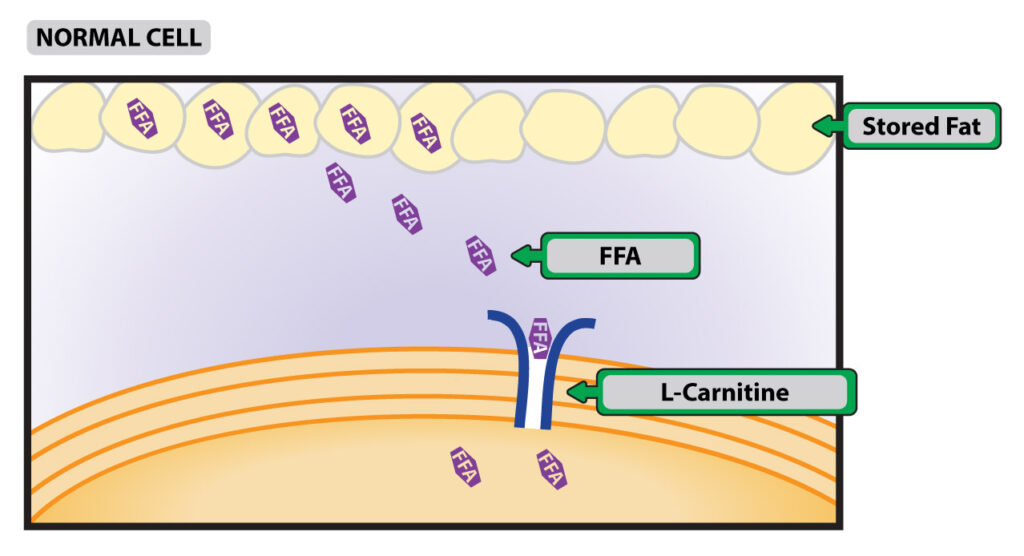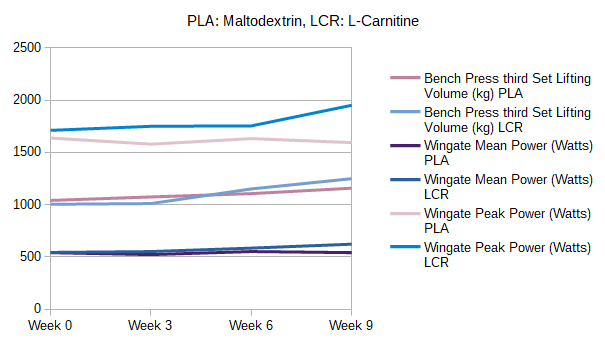L-Carnitine plays an important role in metabolism by facilitating transportation of fatty acids into the mitochondria. Research on L-carnitine has shown that it can enhance exercise performance and fat loss.
When it comes to fat loss, L-Carnitine is one of the most powerful supplements on earth. It helps you break down food better and burn more calories during exercise by transporting long chain fatty acids into your muscles where they’re used for energy or stored as fuel cells in case we need them later! Not only does this help with metabolism but there has been some research demonstrating its effects towards enhancing performance.
L-Carnitine supplementation enhances fatty acid oxidation, increases FFA uptake into skeletal muscle cells and facilitates increased glucose uptake by these cells. l-Carnitine also plays an important role in protecting mitochondria from damage caused by oxidative stress.

Carnitine is used by the body as a carrier that transports long-chain fatty acids into the mitochondria where they can be burned for energy. Long-chain fatty acids can only enter the mitochondria with the help of carnitine.
Studies:
Independent studies have shown that obese patients may have a carnitine deficiency. A deficiency in carnitine reduces the breakdown of fatty acids in the mitochondria. L-carnitine deficiency can result in numerous metabolic problems that are commonly seen in obese people, leading to reduced mitochondrial function.
A.) Nine male athletes underwent two separate trials after 4 weeks of l-carnitine supplementation, which consisted of 50mg/kg body weight per day. The first trial consisted of a 30 minute cycling session at 70% of VO2max, with l-carnitine or placebo ingestion 1 hour prior. In the second trial, subjects had to perform a 30 minute bout of exercise followed by a performance test on a cycle ergometer. l-Carnitine supplementation resulted in increased fat utilization during exercise and led to improved performance. l-Carnitine supplementation also increased the rate of fat metabolism and improved performance during longer bouts of exercise.

B.) Another study detected significant reductions in body weight, body fat percentage, BMI, waist circumference, hip circumference and total skinfolds after l-carnitine supplementation for one year. In addition to noting these physical changes l-carnitine supplementation lead to a significant increase in VO2max levels as well as enhanced fatty acid oxidation and glucose uptake by muscles. The authors noted that l-carnitine has been shown to modulate gene expression related to energy metabolism and mitochondrial function in skeletal muscle cells exposed to high concentrations of free fatty acids (FFAs).
C.) A meta-analysis of randomized controlled trials found that L-carnitine supplements are an effective treatment for influencing biomarkers of metabolic syndrome. The results of 9 random, placebo-controlled studies with male and female subjects over 18 years old were analyzed for their outcomes which regard to waist circumference, systolic blood pressure, diastolic blood pressure, fasting blood sugar, triglycerides, and cholesterol. The most significant results were reduced waist circumference, improved insulin sensitivity and glucose control.
“L-carnitine supplementation can improve glucose metabolism via several mechanisms. First, the enhancement of mitochondrial oxidation of accumulated long-chain acyl-CoA produces insulin resistance in muscle and the heart. Second, it induces changes in glycolytic and gluconeogenic enzymes. Third, it modifies the expression of genes associated with the insulin-signaling cascade. Finally, it improves glucose utilization by the heart”
The study authors concluded that L-carnitine supplementation is correlated with improved biomarkers for Metabolic Syndrome.
Koozehchian, M. S., Daneshfar, A., Fallah, E., Agha-Alinejad, H., Samadi, M., Kaviani, M., Kaveh B, M., Jung, Y. P., Sablouei, M. H., Moradi, N., Earnest, C. P., Chandler, T. J., & Kreider, R. B. (2018). Effects of nine weeks L-Carnitine supplementation on exercise performance, anaerobic power, and exercise-induced oxidative stress in resistance-trained males. Journal of exercise nutrition & biochemistry, 22(4), 7–19. https://doi.org/10.20463/jenb.2018.0026 https://www.ncbi.nlm.nih.gov/pmc/articles/PMC6343764/
Choi, M., Park, S., & Lee, M. (2020). L-Carnitine’s Effect on the Biomarkers of Metabolic Syndrome: A Systematic Review and Meta-Analysis of Randomized Controlled Trials. Nutrients, 12(9), 2795. https://doi.org/10.3390/nu12092795
Mayo Clinic. (2021). Metabolic Syndrome. Retrieved from: https://www.mayoclinic.org/diseases-conditions/metabolic-syndrome/symptoms-causes/syc-20351916
Jon Legere
Jon Legere is the Director of Marketing at Legere Pharmaceuticals, where he oversees all strategic marketing initiatives, brand development, and customer engagement efforts. With an MBA and 11 years of specialized experience in the dietary supplement industry, Jon brings a wealth of knowledge in consumer behavior, product positioning, and digital marketing strategies. His expertise has been pivotal in driving growth, innovation, and market share for Legere Pharmaceuticals, as he remains committed to promoting health and wellness through cutting-edge supplements.




